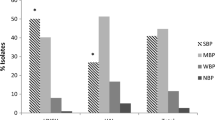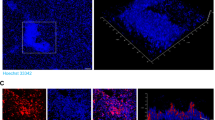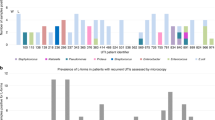Summary
Adherence ofEscherichia coli to uroepithelial cells is an important step in the pathogenesis of urinary tract infection. The process is frequently mediated by pili which undergo phase variation in response to changes in environmental growth conditionsin vitro. It is possible that phase variation of pili and other bacterial virulence factors may play a role in the pathogenesis of bacterial prostatitis. The obvious differences in the environmental conditions of urethra, bladder, and prostate could favor strains that have the ability to adapt. For example, adhesion to the urethral and bladder mucosa could be facilitated by pili and their expression could be advantageous in the early phase of prostatitis. However, after the prostate ducts are colonized, pili may be detrimental since they can renderE. coli more susceptible to phagocytosis. Further studies on phase variation of virulence factors of bacteria that cause prostatitis appear warranted.
Zusammenfassung
Das Anheften vonEscherichia coli an uroepitheliale Zellen ist ein wesentlicher Schritt in der Pathogenese von Harnwegsinfektionen. Dieser Vorgang wird häufig durch Pili vermittelt, die als Antwort auf milieubedingte Veränderungen der Wachstumsbedingungenin vitro einen Phasenwechsel durchmachen. Es ist möglich, daß dieser Phasenwechsel bei Pili oder anderen bakteriellen Virulenzfaktoren in der Pathogenese der bakteriellen Prostatitis eine Rolle spielt. Adaptationsfähige Stämme könnten im Hinblick auf die eindeutigen Milieuunterschiede in Urethra, Blase und Prostata begünstigt werden. So könnte beispielsweise das Anheften an die Schleimhaut der Harnröhre und Blase durch Pili gefördert werden, und deren Expression wäre in der frühen Phase der Prostatitisentstehung von Vorteil. Nach Kolonisation der Prostatagänge könnten sich die Pili dagegen nachteilig auswirken, da sie die Phagozytose vonE. coli erleichtern. Weitere Untersuchungen zum Phasenwechsel bakterieller Virulenzfaktoren von Erregern der Prostatitis erscheinen wünschenswert.
Similar content being viewed by others
References
Hultgren, S. J., Schwan, W. R., Schaeffer, A. J., Duncan, J. L. Regulation of production of type 1 pili among urinary tract isolates ofEscherichia coli. Infect. Immun. 54 (1986) 613–620.
Hultgren, S. J., Porter, T. N., Schaeffer, A. J., Duncan, J. L. Role of type 1 pili and effects of phase variation on lower urinary tract infections produced byEscherichia coli. Infect. Immun. 50 (1985) 370–377.
Schaeffer, A. J., Schwan, W. R., Hultgren, S. J., Duncan, J. L. Relationship of type 1 pilus expression inEscherichia coli to ascending urinary tract infections in mice. Infect. Immun. 55 (1987) 373–380.
Kisielius, P. V., Schwan, W. R., Amundsen, S. K., Duncan, J. L., Schaeffer, A. J. In vivo expression and variation ofEscherichia coli type 1 and P pili in the urine of adults with acute urinary tract infections. Infect. Immun. 57 (1989) 1656–1662.
Silverblatt, F. J., Dreyer, J. S., Schauer, S. Effect of pili on susceptibility ofEscherichia coli phagocytosis. Infect. Immun. 24 (1979) 218–223.
Nowicki, B., Vuopio-Varkila, J., Viljanen, P., Korhonen, T. K., Mäkelä, P. H. Fimbrial phase variation and systemicE. coli infection studied in the mouse peritonitis model. Microbial Pathogenesis 1 (1986) 335–347.
Zak, K., Diaz, J. L., Jackson, D., Heckels, J. E. Antigenic variation during infection withNeisseria gonorrhoeae: Detection of antibodies to surface proteins in sera of patients with gonorrhea. J. Infect. Dis. 149 (1984) 166–174.
Author information
Authors and Affiliations
Rights and permissions
About this article
Cite this article
Schaeffer, A.J. Potential role of phase variation of type 1 pili in urinary tract infection and bacterial prostatitis. Infection 19 (Suppl 3), S144–S149 (1991). https://doi.org/10.1007/BF01643685
Issue Date:
DOI: https://doi.org/10.1007/BF01643685




